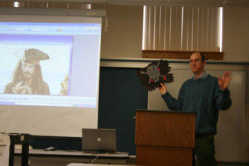Witches, pirates and Pocahontas at PC library

GREENCASTLE -- Unsolved mysteries is not just the name of a television series. In American history, there are true unsolved stories about pilgrims, pirates and witches.
DePauw University's Dr. David Gellman presented some new sides to some very old mysteries during a brownbag lunch lecture "Unsolved Colonial Mysteries: Witches, Pirates & Pocahontas" at the Putnam County Library Tuesday.
"These stories tell us something about what it was like to be alive during these times," said Gellman. "There is a difference in relationships between what we remember about these subjects versus what really happened."
Gellman described how Americans search for alternatives where events could have taken a different twist.
"It's sort of the road not taken," he said. "If an Indian woman and Capt. John Smith could have fallen in love, it lets us believe in the better part of the story of who we are."
There are a couple of problems in believing the story of Pocahontas saving Smith's life by throwing herself in front of him (as in the Walt Disney movie) acknowledged Gellman.
"Pocahontas was one of many children of her father the chief, clubbing someone to death was a sentence reserved for very serious crimes, and Pocahontas would have been about 10 years old at this time. Smith was closer to about 28," explained Gellman.
It is more likely, according to Gellman, Smith went through an adoption ceremony where he was formally made a son of the tribe.
Most interesting was Gellman's observation that the story of Pocahontas saving Smith's life did not surface until after her death.
"Smith wrote these events three different times. Each was published. Only in the third version does he mention her, when everyone associated with it was dead," noted Gellman.
People chose to remember this as a romance because they like to believe in alternatives, explained the history professor.
In real life, Pocahontas married John Rolfe, who did some very memorable things. Rolfe was the first person to record the arrival of African slaves to the Americas, and he was the man who figured out how to make the Indian's tobacco come out as a product that could be mass marketed.
"Without tobacco, we don't get slavery," commented Gellman.
The professor went on to talk about the pilgrims and the Puritans, King Phillip's war (Phillip was an American Indian) and the true picture of the Americas in the 1660s and '70s.
The fear of disorder comes up over and over again in his lecture.
"These were very orderly people. They were ruled by their religion, a respect for religion and a gender hierarchy," said Gellman.
This is apparent in the Salem Witch trials as well.
"Three things occurred, creating the makings of a perfect storm of hysteria," said Gellman. "Their charter was revoked by England and they were no longer self-governing. The minister was not respected and the differences between rich and poor became more distinguished."
"It was convenient for magistrates to imagine an infestation among the people at this time," he continued.
Gellman prefaced his subject of pirates by stating that we all love pirates. He even waved a pirate flag made by his son while flashing a picture of actor Johnny Depp as Captain Jack Sparrow.
He explained that arbitrary, unpleasant hierarchal environment on ships during this time and compared it to the democracy that pirates sailed under.
"Pirates distributed their bounty equally. A captain, quartermaster and a counsel led them. They even took care of their disabled members," he said.
It was an appealing alternative to sailors, many of whom were privateers during the Spanish War. After the war, it became a criminal activity.
Pirates had short lives and spent their riches almost as soon as they took them.
"They spent their booty on wine, women and song in any port that would allow them in," said Gellman.
"It was a question of control versus chaos. In fact, that phrase really describes early America," said Gellman.
Toward the end of the lecture, Putnam County Judge Diana LaViolette commented, "I'd rather spend time with Johnny Depp than with Cotton Mather."
"Both of them had interesting hair styles," laughed Bonnie Yahrus.
Gellman is an associate professor at DePauw teaching US History courses. He can be reached at 658-4587 or by emailing dgellman@depauw.edu.
